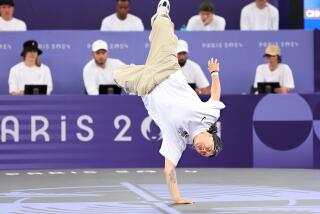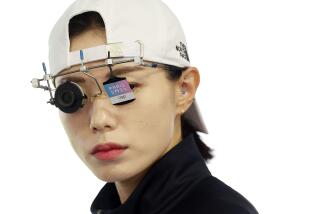Asian Games Report : South Koreans’ Success Is Sweet
- Share via
SEOUL, South Korea — Early in the second half of the men’s basketball championship game Friday at the Asian Games, after China had built its lead over South Korea to 11 points, Dr. Choy Man Lip boldly predicted a Chinese victory.
Considering that Choy is secretary general of the Korean Olympic Committee, he was expected to exude more optimism. His wife, Bae Yung Hee, called him on it.
Neither’s basketball expertise should be taken lightly. They graduated from UCLA.
“There is always hope,” she said.
“Want to bet?” he said.
Both were right.
There was hope, but China won, 77-74, after a last-second, potential three-point shot by the South Koreans bounced off the rim, finally silencing a boisterous crowd of 20,000 that had filled Chamshil Gymnasium. Fortunately for Bae Yung Hee, she had not put her money where her heart was.
It was one of the rare disappointments South Korean sports fans have suffered during the Asian Games, which end Sunday.
Earlier Friday, Choy, his wife and their daughter, Choy Jae Hee, a Harvard architecture student, had been at the Olympic Stadium, watching the South Koreans win three gold medals in track and field, a sport in which they were expected to win no more than two during the entire six-day competition.
But, surely, the South Koreans scored their most stunning victories in table tennis, where they upset the world champion Chinese in the finals of the men’s and women’s team events.
Or were the most stunning victories in field hockey, where both South Korean teams won gold medals, the men by defeating world champion Pakistan and the women by beating world champion India?
Or were they in judo, where the South Koreans have dominated perennially powerful Japan?
“Home-field advantage,” Choy said modestly when asked about the South Koreans’ seeming invincibility in sports where before they had been invisible.
Hometown calls, some of the losers have suggested.
When South Korea won the men’s team badminton championship over world champion China, the Chinese refused for 90 minutes to attend the awards ceremony in a protest against the calls of the line judges, the majority of them South Korean. Badminton players from Indonesia had complained earlier.
When the Chinese finally agreed to accept their silver medals, they stuffed them into their pockets.
There also have been disputes over the officiating in field hockey, boxing and track and field, most of it to the advantage of South Koreans.
Controversy surrounded the women’s 800-meter final Tuesday, when the winner, from India, was disqualified for running out of her lane, giving the gold medal to a South Korean. Newspapers in India editorialized Wednesday that their country should receive credit if South Korea finished ahead of Japan in the medal standings by one gold medal.
In Seoul that morning, it was front-page news that South Korea had vaulted ahead of Japan by one gold medal for second place. That was the only race, first place having been conceded to the Chinese.
Since then, Japan’s Rising Sun flag has been mostly sitting. Through Friday, the South Koreans had an edge over the Japanese that appeared insurmountable.
Excuse the South Koreans if they gloat.
There is deep resentment here toward the Japanese, who colonized Korea from 1910 until the end of World War II in 1945. During that period, the Japanese army forced Koreans to study Japanese as the only language in schools, worship at Japanese Shinto Temples and take Japanese names. South Koreans today claim it was attempted “cultural genocide.”
Korea’s first Olympic champion was Sohn Kee Chung, who won the marathon in 1936 at Berlin. But he ran for Japan under the name of Ketei Son. That is how it was listed on the monument to marathon champions in Culver City until recently, when Sohn attended a ceremony to see it changed.
“I was a man without a country,” Sohn told Sports Illustrated in 1984. “Under those conditions, a man cannot really be a man.”
Fifteen years after the end of colonial rule, South Korean President Syngman Rhee allowed the Japanese to return for athletic competitions in 1960.
“President Rhee hated the Japanese,” said Park Shin Ja, South Korea’s most famous basketball player and a member of the 1960 women’s team that beat the Japanese at Seoul in ’60. “He said they had been here long enough.
“The main thing I remember about playing the Japanese that first time was the number of letters and cards we received from the Korean people, who begged us to win.
“I think the reason I’m still popular after being retired for more than 20 years is because I was never on a team that lost to Japan.”
Although there are normal relations between the two governments now, South Korean sports fans still beg their teams to beat the Japanese. For that matter, they beg every team to beat the Japanese.
Japanese athletes tried to gain favor here by waving tiny South Korean flags during the opening ceremony. The fans responded with polite applause, the only time the Japanese have heard that since they arrived. The South Koreans’ favorite team is South Korea. Their second-favorite team is whoever is playing Japan.
South Korea got its most significant international victory over the Japanese at Baden Baden, West Germany, when Seoul was selected over Nagoya, Japan, by the International Olympic Committee as host city of the 1988 Olympic Games.
“The African countries were as excited as we were,” said Bae Yung Hee, who was at Baden Baden with her husband. “They said: ‘You have won over the country that colonized you.’ Until then, I hadn’t thought about it like that.”
Most people here, however, were not confident when the government, from President Chun Doo Hwan on down, stressed the importance of winning more medals than Japan in the Asian Games, something the South Koreans had never even threatened to do. In 1982 at New Dehli, South Korea won 28 gold medals to Japan’s 57. China was first with 61.
“When people began talking about beating Japan, I thought, ‘Dream on,’ ” Choy Jae Hee said.
Meantime, her father and other South Korean sports officials were acting to make the dream come true.
“Since the success in Baden Baden, we have changed the sports infrastructure,” said Yoon Kang Ro, the Korean Olympic Committee’s director of international sports. “All of the heads of our individual sports associations are chairmen of successful corporations, which can financially support those sports.”
For example, after the upset victories over China in table tennis, the head of South Korea’s Table Tennis Assn. announced that two players, one man and one woman, each would receive $170,000.
Yoon said the Korean Amateur Sports Assn. also has a bonus system, which financially rewards athletes, depending on the number of medals they win in international competitions. He said it is financed primarily by corporations, but South Korean smokers also make a contribution with the sales tax they pay on cigarettes.
More to Read
Go beyond the scoreboard
Get the latest on L.A.'s teams in the daily Sports Report newsletter.
You may occasionally receive promotional content from the Los Angeles Times.






